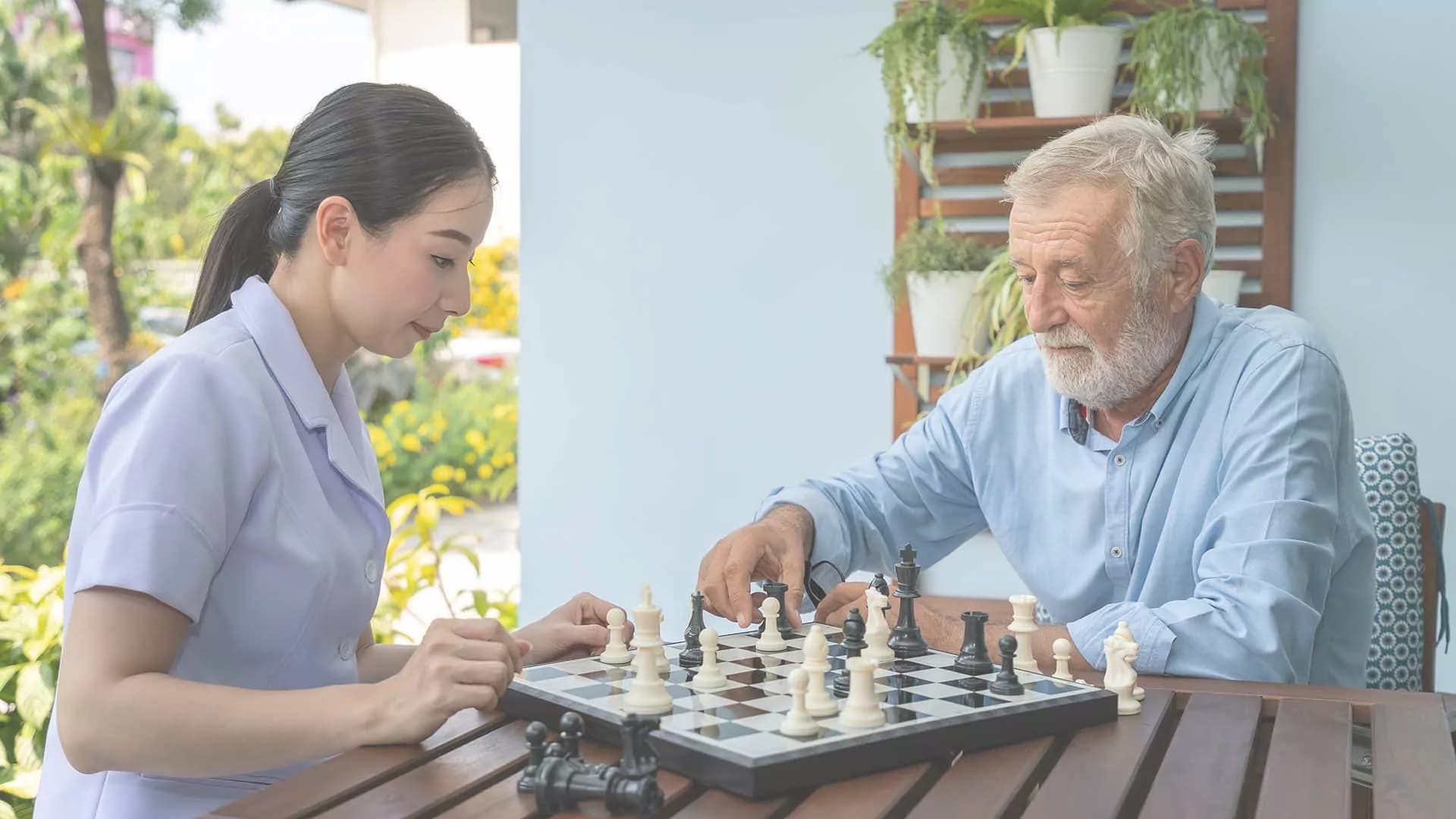Seniors with Dementia: Dementia is a condition that affects memory and thinking. It can be hard for seniors to communicate or engage in regular activities. Word games can be a helpful tool to keep their minds active and improve their emotional well-being.
These games are simple, fun, and can be adapted to different stages of dementia.
In this guide, we’ll look at some of the best word games for elderly people with dementia. We’ll explain how these games help, how to choose the right ones, and how to make playing easier and more enjoyable.
Top 5 Word Games for the Elderly with Dementia
When caring for elderly people with dementia, it’s important to keep their minds active long term assisted living. Word games can help improve memory, reduce stress, and boost mental sharpness.
Here are five simple and engaging word games for seniors with dementia:
Here are 5 engaging word games for seniors with dementia, with ratings and Download Links:
Word Search Puzzle Game
- Type: Word Search
- Rating:8 (Google Play), 4.5 (App Store)
- Description: Search for specific words hidden in a grid of letters. This classic game helps with pattern recognition and memory. It’s a calming activity for seniors with dementia.
- Download Link:
Picture-Word Matching
- Type: Matching Game
- Rating:5 (Google Play), 4.7 (App Store)
- Description: Match images with their corresponding words. This game encourages recognition and memory recall, making it suitable for seniors in the early stages of dementia.
- Download Link:
Hangman
- Type: Word Guessing
- Rating:4 (Google Play), 4.6 (App Store)
- Description: Guess letters to complete a word. Hangman helps with letter recognition and memory, providing a fun and simple challenge for seniors.
- Download Link: Google Play:
- App Store:
Category Naming Game
- Type: Naming Game
- Rating:5 (Google Play), 4.6 (App Store)
- Description: Name items within a specific category, like fruits or animals. This game stimulates verbal fluency and is great for group activities or individual play.
- Download Link:
Alphabet Game
- Type: Word Recall
- Rating:3 (Google Play), 4.4 (App Store)
- Description: Players come up with words starting with each letter of the alphabet. It encourages cognitive thinking and word association and can be adapted for different difficulty levels.
- Download Link: Google Play:
- App Store:
These games are enjoyable and beneficial for memory stimulation, helping to reduce anxiety in seniors with dementia.
Let’s dive deeper into why these games work and how to choose the right ones for elderly loved ones.
Benefits of Word Games for Dementia Patients
- Stimulate the Brain: Word games can keep the brain engaged. Solving puzzles or matching words with pictures can help maintain memory and language skills.
- Promote Social Interaction: Playing word games together with family members or caregivers encourages conversation and bonding.
- Boost Confidence: When Seniors with Dementia complete a word game, they feel a sense of accomplishment. This helps build their self-esteem.
- Reduce Stress: Simple word games can be a relaxing activity. They give seniors something to focus on and enjoy, reducing feelings of anxiety.
Types of Word Games for Different Stages of Dementia
Early-Stage Dementia
For seniors in the early stages of dementia, their cognitive abilities are still fairly strong. Here are some suitable games:
- Word Search: In a word search, players find hidden words in a grid. This game helps with memory and pattern recognition. You can adjust the difficulty by choosing smaller grids and shorter words.
- Crossword Puzzles: These puzzles involve filling in blank squares based on clues. It’s great for challenging the mind but can be simplified with easier clues or smaller grids.
- Spelling Games: Simple spelling games, either on paper or through apps, are a great way to reinforce language skills.
Middle-Stage Dementia
As dementia progresses, it becomes harder to concentrate and recall words. These games are ideal:
- Picture-Word Matching: This game pairs pictures with their corresponding words. It’s a good way to trigger memory and recognition, especially with everyday objects.
- Simple Word Puzzles: These are word puzzles that involve fewer words and larger fonts, making them easier to handle.
- Category Naming Games: In this game, seniors are asked to name as many items as possible in a specific category (like animals, colors, or foods). It’s an easy way to practice word recall.
Late-Stage Dementia
For those in the later stages of dementia, word games need to be as simple as possible. The following games work well:
- Word Association Games: You say a word, and the senior responds with a related word. This back-and-forth game is easy and can spark memory connections.
- Interactive Storytelling: In this game, the caregiver starts a sentence, and the senior completes it with one word. This helps with language recall and creativity.
- Alphabet Games: In this game, players come up with words that start with each letter of the alphabet. It’s a fun, light activity that keeps the brain active.
How to Choose Word Games for Seniors with Dementia
When choosing word games, it’s important to match the game to the senior’s cognitive level.
Here are some tips:
- Pick Familiar Games: Games involving familiar words or themes (like family names, foods, or animals) can trigger memory and reduce confusion.
- Simplify as Needed: If a game seems too complex, try making it simpler. Use fewer words or shorter puzzles. The goal is fun, not frustration.
- Avoid Fast-Paced Games: Word games that move too quickly can be stressful. Look for games that allow players to go at their own pace.
- Focus on Engagement, Not Competition: It’s important that seniors feel included and engaged, not pressured to win. Celebrating participation is key.
Adapting Word Games for Comfort and Ease
Seniors with dementia often have trouble with reading or concentration. You can make word games easier by following these suggestions:
- Use Large Print: Ensure that the words and instructions are big enough to read comfortably.
- Keep Sessions Short: Attention spans may vary, so short, focused game sessions can be more enjoyable than longer ones.
- Play in a Quiet Space: Too much noise or activity can be distracting. Choose a calm, quiet area for playing games.
- Introduce Technology Slowly: Some seniors may enjoy digital games on tablets or computers, but it’s important to introduce these slowly and with guidance.
Examples of Popular Word Games for Seniors with Dementia Patients
Here are a few popular word games that are widely used by caregivers:
- Word Search World Traveler (App): This is a simple word search app with large letters, which can be helpful for seniors. Players search for hidden words in a grid, improving their focus and concentration.
- Boggle: This is a classic game where players create words from a set of scrambled letters. It’s quick and fun and can be adjusted to fit the senior’s ability.
- Hangman: This game involves guessing letters to complete a word. You can make it easier by using simple, familiar words.
- DIY Games: You can create your own word games based on the senior’s interests. For example, make a word search using family members’ names, or create categories based on their favorite hobbies.
Encouraging Participation in Word Games
It’s important to make word games a fun, inclusive activity. Here’s how to encourage participation:
- Play Alongside Them: Caregivers and family members should play too, making the activity feel more social and less like a task.
- Celebrate Small Wins: Even if they only guess one word or match one picture, celebrate that achievement. It boosts their confidence.
- Rotate Games: Offer a variety of games to keep things interesting. Rotate between different types of word games so they don’t get bored.
Conclusion
Word games are a simple, fun way to help seniors with dementia stay mentally active. They can improve memory, foster social interaction, and even provide emotional comfort.
By choosing the right games and making them easy to play, you can help your elderly loved ones feel more connected, engaged, and happy. Whether it’s a quick word search or a storytelling game, these activities can make a big difference in their day-to-day life.












